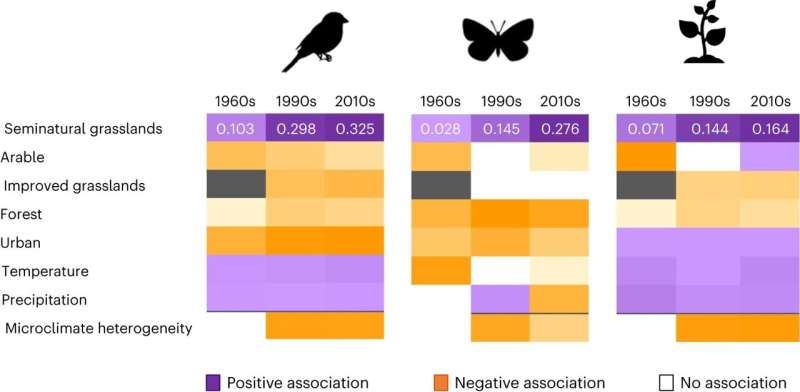This article has been reviewed according to Science X's editorial process and policies. Editors have highlighted the following attributes while ensuring the content's credibility:
fact-checked
trusted source
proofread
Study reveals winners and losers from climate and land-use change

New research from the Swedish University of Agricultural Sciences and Northumbria University has determined that as warm-loving species expand their ranges under climate change, Britain's landscapes are losing their biological uniqueness.
The researchers took advantage of the long tradition of biological recording in Britain, combining long-term observations of birds, butterflies and plants with a new map of land-use change and climate data from the Met Office. Like much of the world, Britain has become warmer (and wetter) over the last 100 years. At the same time, the land has been increasingly converted for agriculture and built on for towns and cities.
The new study, published in the journal Nature Ecology and Evolution shows that the average number of species has increased in landscapes across Britain, with the largest gains occurring in the areas where the environment has changed the most.
"It can seem strange that, in the depths of a global extinction crisis, we are finding that the overall number of species found at a local level are increasing. But this is actually not a very uncommon result," explained Dr. Andrew Suggitt, Assistant Professor in Ecology at Northumbria University.
"What is different about our study is that we have related these changes to how we are changing the land, and to increasing temperatures."
The researchers maintain that it is not the case that environmental change is good for biodiversity, but rather that as different human activities modify the landscape, it is the same cohort of "winner" species that are best able to capitalize—and they do so very successfully. This widespread phenomenon has resulted in ecological communities around Britain becoming more similar over time.
"While human activity seemed to be driving increases in species numbers, it was also driving what we call 'biotic homogenization'—where areas which were once quite distinctive are now losing their uniqueness," said Dr. Alistair Auffret, Lecturer in Ecology at the Swedish University of Agricultural Sciences.
"Our results also showed that a retention of semi-natural habitat, particularly grasslands, was important for maintaining biodiversity in our landscapes. We found that the importance of this positive effect of grasslands more than doubled over our period of study."
Another potentially worrying result was that, although the majority of land cover change had already occurred by 1990, the trend of "biotic homogenization" has continued. This could indicate that species declines have still not yet caught up with harmful human activities that have slowed down or ceased.
"The possibility for lagged effects of environmental change makes the case for protecting and restoring our natural systems even more pressing," said Dr. Suggitt.
The new paper follows a collaboration between the two universities last year which, for the first time, mapped how land-use has changed across Britain throughout the last century. That study, "Linking climate warming and land conversion to species' range changes across Great Britain," was published in Nature Communications.
More information: Teresa Montràs-Janer et al, Anthropogenic climate and land-use change drive short- and long-term biodiversity shifts across taxa, Nature Ecology & Evolution (2024). DOI: 10.1038/s41559-024-02326-7
Provided by Northumbria University



















